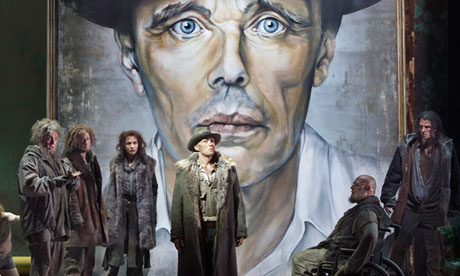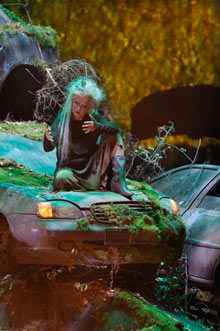
Built into the side of a mountain, Salzburg's festival buildings - home to the most gilded event in the international summer calendar - forge art and nature in abrupt union. Backstage, orchestral players spill out on to the street from a dank, rocky cavity. Front of house, all is polished and gleaming, the rough made smooth in this rich city, birthplace of Mozart, to whom it never brought prosperity.
One of the main venues is the Felsenreitschule - literally rock riding school. (If the name sounds familiar, this is the time to mention, once only, The Sound of Music, Salzburg's other touristic lure.) The grand auditorium still has the empty arcades where audiences sat in days when archbishops regarded riding and hunting as a daily perk. It retains a ghostly air of the gladiatorial.
All this mix of sacred and profane proved a perfect match for , Harrison Birtwistle's epic opera, which launched the Salzburg season to noisy ovations and plenty of controversy last week. Courtly love, blemished heroism and the cycle of the seasons are spun around an Arthurian legend that begins and ends at Christmastide. At its centre is a three-day trial of truth, punctuated by cockcrow and hunting horns as stag, boar and fox are slain.
Birtwistle, with his regular collaborator, the poet David Harsent, has shaped a potent drama from the 14th-century romance, Sir Gawain and the Green Knight. This large-scale opera requiring the Green Knight to have his head chopped off yet continue singing - not so easy, and dodged in Salzburg - had its premiere at London's Royal Opera House in 1991. Revivals of that staging aside, it has not been seen since.
The brilliant cast, convened at short notice when Gawain replaced an unfinished opera by György Kurtág, was led by Christopher Maltman in the title role, with John Tomlinson reprising the part of the mythical Green Knight. Both baritone and bass, each on peak form, are masters in the art of acting as well as singing. In the event this was more of a godsend than usual.
The same was true for Lady de Hautdesert, sung with vivid lyricism by the rising-star British mezzo Jennifer Johnston, Laura Aikin as the will-o'-the-wisp Morgan le Fay and Jeffrey Lloyd-Roberts as Arthur, king of a dissipated court. In a clumsy equation, Arthur had to sit in a wheelchair, abandoning it in the final scene of tentative renewal. (Later the same evening in Salzburg's dull new - decently sung but lacking sap or wit - the "cuckolded" Ford was also playing at being a wheelchair user. As operatic fads go, this latest ranks high for crassness.)
Ingo Metzmacher, conducting, conjured glistening, spangling sounds from the enormous orchestra - the superb ORF Vienna Radio Symphony Orchestra complete with three tubas, euphonium, flugel horn and a battery of tuned and untuned percussion. This was an ambitious undertaking. How canny of Salzburg to make Birtwistle a featured composer: next year everyone will be at it, in celebration of his 80th birthday.
The score's impact was at once powerfully inexorable and endlessly fresh. This high-profile production confirmed that Gawain is assured a future life, whatever directors choose to do with it. In this case the answer was all and nothing. Apparently the Latvian director Alvis Hermanis is part of a school of "post-dramatic" directors. Whoever dreamed up that term knew what they were talking about. Hermanis displayed a novel degree of ignorance towards the text, with a litany of illogical decisions and narrative inconsistencies.
He may have had some other opera in mind - conceivably one that has not yet been written - when he came up with his big idea. Forget ancient, verdant Arthurian myth. Embrace, instead, the world of Joseph Beuys (1921-86): sledges and ladders, German shepherd dogs (real), brimmed hat, cloaks, walking sticks, skeletons, coffins, cannibalism. If you check out that German artist on Google images, you will find all boxes emphatically ticked. A gaggle of actors writhe weirdly throughout like neo-sannyasins in search of a Bhagwan, ending up in Beuys's VW camper van, as well you might. It is, of course, supposed to be a future apocalypse.

In the opera-as-Konzept world, this uprooting is no worse than many, and looked stylish enough. Last week at Bayreuth, the Ring got a cowboys'n'crocodiles makeover to hoots of derision. There were no boos in Salzburg, only long cheers and no doubt some bafflement. It must have been a nightmare for the performers, who nevertheless overcame most hurdles by using their own common sense. The good news is that next year the Barbican will give a concert performance, mostly with the same cast, and with kein Konzept.
Birtwistle was also a featured composer at the festival, with a concert in the newly whitewashed baroque splendour of the Kollegienkirche by the Austrian Ensemble for New Music (OENM) conducted by Titus Engel. This virtuosic group played Birtwistle's arrangements of Bach, Ockeghem and Machaut - translucent homages done out of love which ought to be better known - as well as the pivotal Verses for Ensembles (1968/69).
In the same venue Klangforum Wien, one of the most experienced European contemporary music groups, conducted by Sylvain Cambreling, played Birtwistle'sSecret Theatre as if their very souls depended on it. Everyone is a soloist. The revelation was 9 Settings of Celan (1989-96), heard together for the first time in an ethereal, cool but heartfelt performance by Claron McFadden.
All this was as remote as possible from the hot, upfront energies of the Youth Orchestra of Caracas - another of the El Sistema orchestras about which I can only say with confidence that it comprises 175 players, aged 14 to 22 - who gave an impassioned programme of Shostakovich and Tchaikovsky, also in the Felsenreitschule (conductor, Dietrich Paredes). Their founding father, José Antonio Abreu, together with their musical guru Gustavo Dudamel, cheered from the front stalls as these gifted young musicians progressed through their musical journey, ending with their favourite routine: the shirt-swapping, red-yellow-blue Venezuela jacket-wearing delivery of Mambo. The noise level was near deafening.
Nothing was as noisy, though, as Glenn Branca's Twisting in Space, alas the only event I could sample last weekend in the first London contemporary music festival - which deserves its subtitle, Bold Tendencies. Branca's ambitious ensemble piece, with its ranged and layered masses of raw sound - minimalism maximised - was played in Peckham's 1960s multistorey car park. Increasingly a venue of choice, its cavernous recesses and mossy concrete vaults were, surprisingly, an excellent preparation for Salzburg.
No comments:
Post a Comment